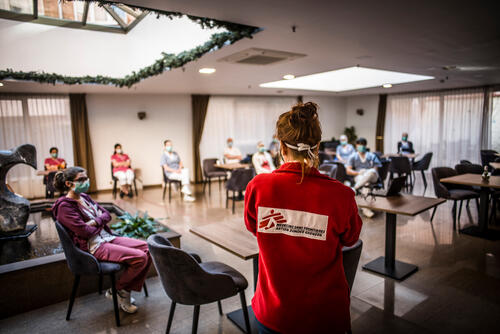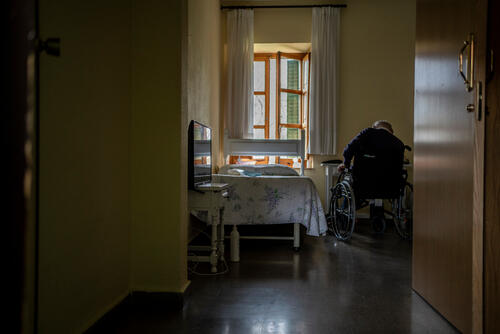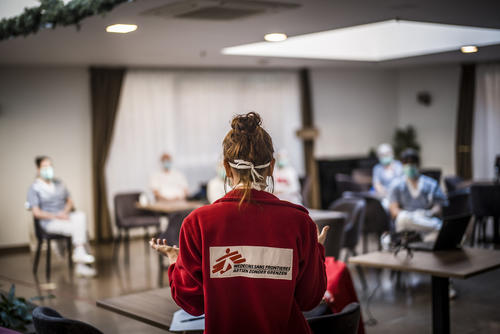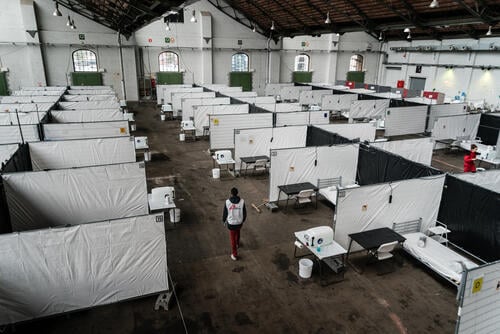“I was on the phone with the director of a care home the other day and he was palpably upset. One of his residents was suffering from COVID-19 and needed to be hospitalised, but the emergency services refused to take him – there just wasn’t space at the hospital.
When the care home director said they couldn’t manage the elderly man’s medical care, the emergency services said there was nothing they could do and quietly suggested he should simply up his doses of morphine. I could feel the director’s emotion over the phone, telling me that’s not why he got into this job.
That’s how bad the situation is here, and that’s why MSF had to act.
Since starting, we’ve been involved with 48 care homes in Brussels. We’ve been advising on infection prevention and control and training in the correct use of personal protective equipment (PPE).
In about half the care homes we’ve visited, we’ve done some training and made clear that we’re available for further support, if needed, and that has been enough. But the situation in the other care homes has been more problematic.
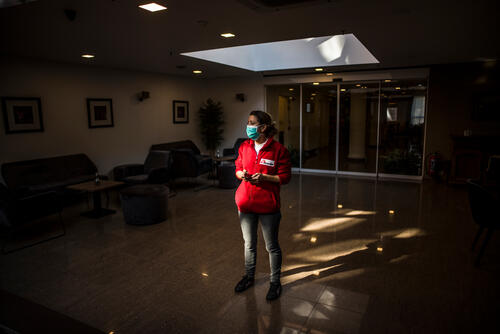
My team went to a care home last week where 20 residents had already died from COVID-19. There were 51 residents left, and only four staff in the entire building – including cleaning staff, kitchen staff and nursing staff. Those four people were doing the very best they could and were running from person to person and trying to keep on top of it all, but obviously it was absolutely chaotic.
There were trays stacked up in the corridors and people shouting out for attention. Hearing one woman calling for help from her room, our health promoter tended to her and helped to get her up and dressed. There was nobody else to do it.
The situation there was shocking, but it hadn’t happened overnight. It had deteriorated day by day and the managers of the care home hadn’t been able to get on top of it. They’d tried, but it’s difficult when you start the day thinking that you’ve got a full complement of staff but then, one after the other, people call in sick.
That’s why protecting and supporting staff in care homes is so vital during this crisis. And that’s where we, as MSF, can offer real assistance. With COVID-19, you can’t just focus on the hospitals. You need to help the care homes, because they really are on the frontline.
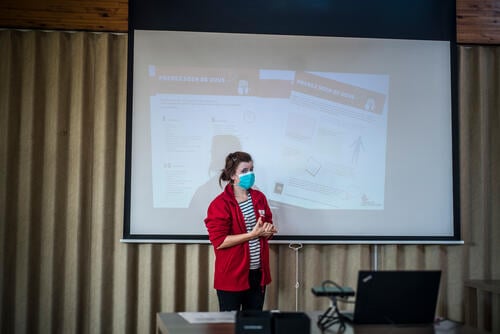
We have a lot of experience working in outbreaks, managing infection prevention and control and using PPE properly. With so much information out there, care home staff are often unsure about which practices are right or wrong and, as a result, are understandably confused and scared.
People are putting on extra pairs of gloves but failing to use disinfectant properly – overcompensating in some areas but failing in others. We’re able to say: ‘You’re not protecting yourself at these points. Let’s go back to the basics.’
The response from care home staff has been really positive. The staff have felt so alone in this crisis; their morale has been all over the place. Having people come in to listen to them and help them, so they can feel safe and can do their job with confidence, has been really appreciated.
For staff in care homes, these elderly residents who are suffering and dying are not just patients. They are people they’ve got to know and cared for over many years. And when a resident dies, the staff have no time to grieve. They can’t meet the family and they have to be back at work five minutes later. That burden is taking its toll.
One of MSF’s guiding principles is that we will always look out for the most vulnerable. And in this pandemic, the elderly really are the most vulnerable.Stephanie Goublomme, MSF care home response coordinator, Belgium
Equipment shortages
The shortage of PPE is obviously an issue. Many of the homes we are supporting have enough equipment for a few days, but after that? Initially it was masks but now we’re seeing many homes where the staff are short of aprons.
But MSF is used to working in places where there are equipment shortages. We’ve become very good at making do with what we have and using things in the best and safest way possible. That means we can say to staff in the care homes: ‘Let’s be honest, it sucks that there are not enough aprons – aprons are important and we’re pushing to get them – but let’s focus on all the things we can still do to protect ourselves and others with the equipment we’ve got.’
Treating the most vulnerable
One of MSF’s guiding principles is that we will always look out for the most vulnerable. And in this pandemic, the elderly really are the most vulnerable. I spoke to another care home director the other day after one of her residents had committed suicide. She told me that most of the residents were depressed, with many refusing to eat and drink. They were stuck in their rooms and didn’t see the point of carrying on.
If we can assist in ways that mean some residents can soon leave their rooms and at least socialise with other residents in the common areas, then that will make a real difference and ultimately save lives.”



